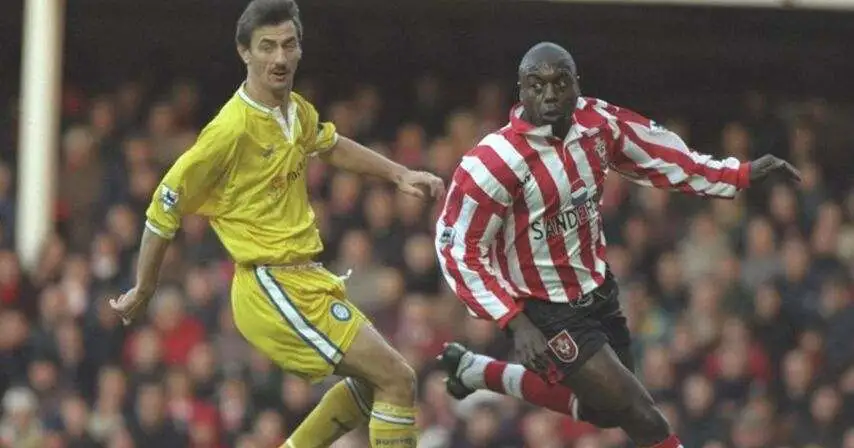
Remembering the Time When a Conman Played in the Premier League
The story of Ali Dia playing a Premier League match is one of the most bizarre and comical moments in football history—a tale so unbelievable, it feels like it was plucked from a movie script.
Imagine a man, virtually unknown in the football world, talking his way onto the pitch in the world’s most-watched football league, and actually playing for one of the biggest clubs in England at the time. Sounds unreal, right? Well, that’s exactly what happened in November 1996, when Ali Dia fooled everyone, including Southampton’s then-manager Graeme Souness, into thinking he was a professional footballer.
The Phone Call That Started It All
The legend of Ali Dia began with a phone call—one that would go down as one of the most outrageous cons in football. Dia, a man with limited footballing ability but unlimited audacity, had a friend who called Southampton’s manager pretending to be George Weah, the 1995 FIFA World Player of the Year. Incredibly, Souness bought into the story. The "fake Weah" convinced him that Dia was his cousin, and an accomplished Senegalese international who had even played for Paris Saint-Germain.
Now, in any other situation, this claim would have set off alarm bells. How could a Premier League manager not verify such a player’s credentials? But Souness was desperate. Southampton were struggling with injuries, and they needed reinforcements fast. So, without even seeing Dia train or checking his history, Souness invited him for a trial.
From Trial to Debut
What’s remarkable is that Dia’s trial didn’t go particularly well. In fact, it went terribly. He was sluggish, technically poor, and seemed lost during training. Yet, such was the desperation at Southampton, they still signed him on a one-month contract. It’s hard to imagine how he convinced them to ignore the warning signs, but then again, his entire journey to this point had been built on bluff and bravado.
The defining moment of this farce came on 23rd November 1996. Southampton were up against Leeds United at The Dell, their home ground. Dia was named on the bench, which would have been an astonishing achievement by itself, considering he had zero qualifications for the role. But the unbelievable part was yet to come.
Ali Dia's Premier League "Debut"
Southampton were trailing Leeds 1-0 when an injury to club legend Matt Le Tissier forced Souness to make a substitution. In an act that still boggles the mind today, Souness turned to Ali Dia, bringing him on as a substitute. This man, who had no Premier League experience, no top-level football pedigree, and had barely survived his trial, was now playing in the most competitive league in the world.
For 53 minutes, Ali Dia ran around the pitch, looking more like a fan who had won a competition to play with his idols than an actual professional. He was woeful—completely out of his depth. His touch was heavy, his positioning all over the place, and he seemed to have no idea what was happening around him. Le Tissier, who was watching from the bench, later recalled that it was like playing with a Sunday league player.
Dia’s performance was so bad that Souness eventually subbed him off, despite having brought him on earlier in the game. Southampton went on to lose the match 2-0, but the scoreline wasn’t what people were talking about after the final whistle. All eyes were on Ali Dia, the "player" who had somehow managed to con his way into the Premier League.
The Aftermath: Who Was Ali Dia?
After the game, the truth quickly unraveled. It turned out that Ali Dia was not George Weah’s cousin. In fact, he had never played for Paris Saint-Germain, nor had he represented Senegal at the international level. Dia had previously played for semi-professional and lower-league clubs, including a brief spell with non-league Blyth Spartans. His footballing credentials were paper-thin, and his stint with Southampton was a con, plain and simple.
Once Souness and the Southampton management realized they had been duped, Dia was swiftly released. His Premier League career lasted just those infamous 53 minutes. Dia vanished into obscurity, leaving behind a story that would be recounted for years as one of the most ridiculous episodes in English football.
Why Did It Happen?
So how did this bizarre situation come to pass? In the mid-90s, the Premier League wasn’t the highly polished, data-driven machine it is today. Scouting networks were not as extensive or sophisticated, and there was far less access to global player databases. Managers often had to rely on word-of-mouth, agents, or personal contacts to discover new talent. It was in this context that the Ali Dia story was able to unfold.
However, this wouldn’t happen in today’s football world. Modern clubs use vast scouting networks, data analysis, and video scouting to assess players. The idea of a player like Ali Dia slipping through the cracks in 2024 seems virtually impossible. But back then, it was still possible for someone to fake their way into the Premier League.
The Man Behind the Myth
As for Ali Dia himself, he remains something of an enigma. He never gave a full explanation of how he managed to pull off his audacious con, and after his brief flirtation with fame, he largely disappeared from the public eye. It’s believed he went on to study at Northumbria University in the UK and later worked in business. While his football career was a joke, his audacity in trying to bluff his way into the Premier League was extraordinary, and to this day, fans still talk about his infamous cameo as one of the most surreal moments in football history.




